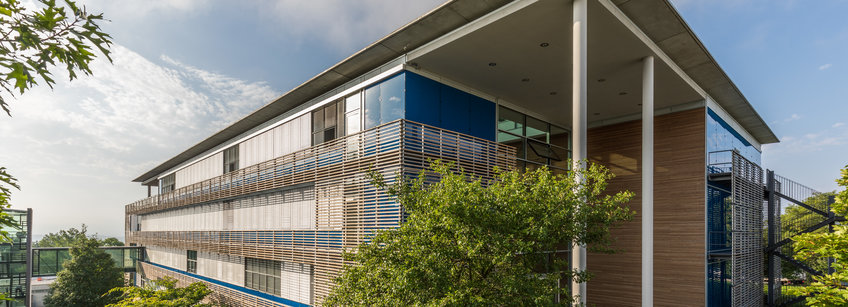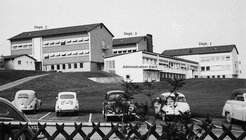
History of the Institute
The Max Planck Institute for Biology, founded in 1954, was originally called the “Max-Planck-Institut für Virusforschung”, and its beginnings date back to 1937. At the time, Adolf Butenandt and scientists of the Biology and Biochemistry Institutes of the Kaiser-Wilhelm-Gesellschaft in Berlin-Dahlem realised the potential of viruses as model organisms in biological research. They initiated a research group to foster virus research. During World War II, the group was relocated to Tübingen, followed by the Biology and Biochemistry Institutes. In 1943, the foundation of the first building to harbour the Biology Institute and the Work Group for Virus Research, the “Max-Planck-Gesellschaft zur Förderung der Wissenschaften e.V.”, was established in Tübingen. As a result of the promising prospects of virus research, in 1956 the work group soon expanded into the “Max-Planck-Institut für Virusforschung” - one of the first institutes of the Max Planck Society.
Early pioneering work in virology and genetics: the first generation

In 1954, the founding directors were Hans Friedrich-Freksa of the Department for Physical Biology, Gerhard Schramm of the Department for Biochemistry and Werner Schäfer of the Department for Virology. In 1960, Alfred Gierer joined the institute as director of the Department for Molecular Biology.
The four departments, each of them housed in a building of its own, shared central facilities such as the library, the electron microscopy facility, the animal facilities, and the greenhouse. When the Max Planck Institute for Biological Cybernetics was founded in 1968, the two Institutes started sharing the use of the guest house, now known as the Max Planck House.
The Max Planck Institute for Virus Research conducted pioneering work on the molecular biology of the genetic code, as well as the structure and function of animal retroviruses and the plant RNA virus TMV.
In 1969, the Friedrich Miescher Laboratory of the Max Planck Society (FML) was established on campus; to this day, it continues to host four independent junior research groups.
A shift towards developmental biology: the second generation
It was one of the FML group leaders, Friedrich Bonhoeffer, who became the first director of this second generation. Bonhoeffer was appointed director in 1972, followed by Uli Schwarz and Peter Hausen. The focus of the institute gradually shifted, so that in 1984 it was renamed “Max Planck Institute for Developmental Biology”. In the following year, the future Nobel Prize winner Christiane Nüsslein-Volhard was appointed director of the Department for Genetics. By the 1990s, the research areas of the institute had come to include the developmental biology of Hydra and frogs, neuroembryology in chickens, and developmental genetics of Drosophila and zebrafish.
Continuous growth and change: the third generation

Following the retirement of Alfred Gierer and Friedrich Bonhoeffer, a third generation of directors began to change the focus of the institute again. When it became clear that a neighbouring Max Planck Institute was going to close its doors in 1998, this freed resources, which could be used for expanding the Max Planck Institute for Developmental Biology. In 1999, Ralf Sommer’s Department for Integrative Evolutionary Biology was added to the institute, soon followed by Andrei Lupas’ Department for Protein Evolution in 2001. A year later, plant biology returned to the institute under Detlef Weigel (Molecular Biology). The appointment of a new generation of directors was completed with Elisa Izaurralde (Biochemistry) in 2005 and Gerd Jürgens (Cell Biology) in 2008.
The retirement of Gerd Jürgens in 2010 and the premature departure of Elisa Izaurralde in 2018 brought about new changes of to the institute: Ruth Ley joined in 2016 as director of the Department for Microbiome Science, in 2020 Susana Coelho added Algal Development and Evolution to the institute, and in 2024 Yen-Ping Hsueh established the Department of Complex Biological Interactions. In addition to the departments and the departmental research groups, the institute hosts several independent research groups.
The broad focus that the institute has gained in recent years is reflected in another renaming: since 2022, it is known under the name of Max Planck Institute for Biology Tübingen.

